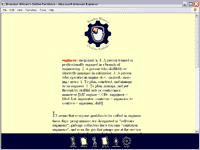There I was, sitting through a mandatory pre-movie advertisement marathon, wishing a plague upon the house of the advertising executive who came up with that “innovation” (“Hey, they’re here anyway, why not show’em some more ads!?”), when I saw an advertisement for this website. Yes, the great battle for the hearts and minds of audiences in the battle against piracy has finally begun in earnest, and Hollywood is pulling out all its dramatic tricks.
In the ad, we see a lowly set painter explaining his job, what he loves about doing it, and why piracy is a threat to his livelihood. Hmm, plausible. Except, when you really think about it, the set painter is one of hundreds of people involved in movies that are way down the totem pole – are they really the ones who are taking a big hit when a movie is ripped off? I’m guessing the lead actor, pulling $20 million, the studios, and the merchandisers are probably the real ones taking the big hit. Note to Jack Valenti & Company: boo-freaking-hoo.
The launch of this campaign coincided with a similar action this week by the RIAA, who issued some 911 subpoenas recently to ISPs of suspected file-sharers. Besides the occasional embarrassing screw-up, the motive behind the RIAA’s actions is also starting to seem a little suspect:
“Verizon, which has fought the RIAA over the subpoenas with continued legal appeals, said it received at least 150 subpoenas during the last two weeks.
There were no subpoenas on file sent to AOL Time Warner Inc., the nation’s largest Internet provider and also parent company of Warner Music Group. Earthlink Inc., another of the largest Internet providers, said it has received only three new subpoenas.”
What is the likelihood that there isn’t a single AOL user running Kazaa? Can you say “zero”? Hmm, dirty games at the RIAA? Say it ain’t so!
The big point that both of these actions are missing is really quite simple: you’re going to lose. Why? Because you’re too slow to stop the technology – you had your chance, you dragged your heels, and now the cat is out of the bag. Heck, some of the major players in the RIAA are electronics manufacturers who are building technology to make it easier to enjoy stolen music and videos!
There’s one other reason that the genie won’t go back in the bottle: the tech-heads creating the digital rights technology are usually the same guys that are ripping off the most music. Even they don’t believe technological countermeasures will succeed – one IBM researcher I talked to at the Financial Cryptography 2000 conference noted: “On the record, SDMI will be the greatest anti-piracy technology ever invented – off the record, it’s a piece of crap, and will probably never see the light of day.” Chances are, as these guys create the technology, their close buddy is working on a way around it.
The next generation of technologies will be no different – the only hope for the RIAA and MPAA is legal pursuit. If the technology community is really smart, they’ll devise technologies that perform the same functions, but operate within the law. How? How about:
- Digital License Exchange Technology: What we need is a technology that will allow users to do with digital copies what they currently can do with physical media. Say I have a copy of “Hootie and the Blowfish” to which I never listen. You, on the other hand, are a huge Hootie fan, with no cash to buy any of their records. With a system to allow users to list licenses they hold, you could “check out” my license for the “Hootie and the Blowfish” songs you downloaded either from me, or through Kazaa, listen to your heart’s desire, and then “check in” the license once you’re done. Seems to me this would be all nice and legal, provided that nobody circumvented a digital copyright protection technology in the process.
- Finely Segmented and Shared Content: Systems like Freenet use schemes such as RAID-5 to segment data across multiple drives (or peers in the case of file-sharing systems) to ensure data redundancy. Usually data is split over three to five different peers. But why stop there? Why not split the content into very small pieces, excerpts, if you will, that are protected by fair use provisions of copyright law? It’s not illegal to share a 6-second excerpt of a song or movie, is it?
All of these legal and technological cat-and-mouse games avoid an even simpler solution: create content for which people are willing to pay. I went to see the Cirque du Soleil last weekend, and Phish the weekend before. Incredible shows – I’d buy their CDs or movies without a second thought given to pirating them. Why? Because they’re unique, they’re doing something interesting. The movie and record industry has morphed into a giant cookie cutter, modifying the recipe slightly from time to time, but never so much as to invent something completely original.
The sooner the entertainment industries remember their original purpose, i.e.: to entertain, and move to develop true artists for the long-term benefit, the sooner the problem of piracy will go away. People want something new, something that makes them feel that child-like sense of wonder at what they’re seeing. And frankly, the latest incarnation of tired stories starring the flavour-of-the-week actress/singer/clothes-designer just ain’t cutting it with the audiences these days.

 Well, to be honest, that’s not the only reason. I was getting tired of the old layout – it’s been relatively unchanged since 2001 – and wanted something new. So, ta-da, here it is. The content itself is unchanged, due to the wonder that is “separating presentation from content” achieved using SSI and various templates. I actually wanted to take it a step further and redo the templates to use CSS, but damned if CSS just doesn’t play well with others. The main change is that the site takes up all available screen real estate, as opposed to only occupying a fixed width strip down the center.
Well, to be honest, that’s not the only reason. I was getting tired of the old layout – it’s been relatively unchanged since 2001 – and wanted something new. So, ta-da, here it is. The content itself is unchanged, due to the wonder that is “separating presentation from content” achieved using SSI and various templates. I actually wanted to take it a step further and redo the templates to use CSS, but damned if CSS just doesn’t play well with others. The main change is that the site takes up all available screen real estate, as opposed to only occupying a fixed width strip down the center. especially in the presence of the wind blasting the amphitheatre from the ravine. Before the concert even began, tortilla UFOs streaked across the concert audience, sometimes making it almost the entire way across the amphitheatre in brave defiance of the laws of baking and gravity.
especially in the presence of the wind blasting the amphitheatre from the ravine. Before the concert even began, tortilla UFOs streaked across the concert audience, sometimes making it almost the entire way across the amphitheatre in brave defiance of the laws of baking and gravity.